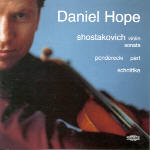It’s remarkable how completely the twenty-something British violin virtuoso Daniel Hope enters into the often tortured world of eastern European composers. The centerpiece of this stimulating recital is Shostakovich’s Op. 134 sonata, an elusive late work whose relative absence from concert programs is inexplicable. Also inexplicable is the surprising discovery that Hope and his young keyboard partner, Simon Mulligan, have made a recording that yields little, if anything, to the classic version by David Oistrakh and Sviatislov Richter. They’re aided by Nimbus’ engineering, which brings the duo into your listening room with startling immediacy and aptly conveys the wide dynamic range of their playing. Oistrakh brings to this great piece tonal nuances beyond Hope’s wildest wishes, but the younger violinist compensates with playing that’s sharply focused and committed. The first movement bristles with tension, its strangeness fully evident. In the second, Hope powerfully projects the movement’s demonic wildness as his slashing attacks and Mulligan’s relentlessly driving keyboard rhythms leave you breathless. In the long, complex final movement the pair sustains the intense mood as well as its renowned Russian rivals.
The rest of the disc may seem anti-climactic after the exhausting depths of the Shostakovich, but it too has its rewards. Penderecki’s six-and-one-half-minute-long Cadenza for solo violin opens with quiet yearning, builds to a powerful, dissonant summit, then descends to a gradual fadeout. Pärt’s spiegel im spiegel is a nine-minute-long exercise in near-hypnotic minimalism that will please those who respond to endless repetition, among whom I am not included. Schnittke’s Violin Sonata No. 3 was completed a month before his last, incapacitating stroke in 1994. The solo violin begins with searching indeterminate phrases that lead to a sprightly, off-center allegro. The heart of the piece is the Adagio, almost as long as the other three movements put together. Grimly poignant, it’s suffused with an other-worldly strangeness that packs emotional power. Hope ends the recital with Schittke’s Stille Nacht, a piece the composer calls “light-hearted”. It’s not. The familiar “Silent Night” melody is turned into a lame, halting ghost of itself, eventually breaking into painful shards.
The booklet has excellent notes by Hope that mix personal anecdote with analysis of the music. Its back cover advertises his first Nimbus disc–Schnittke, Weill, and Takemitsu. I never heard it. Don’t you make the same mistake with this one.
































